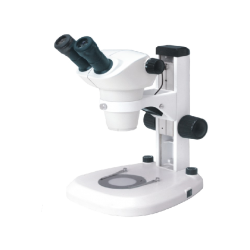
Stereo Microscope LMSM-609 features a binocular viewing head inclined at 45° field of view and an interpupillary distance of 55-57mm for comfortable viewing. It has a zooming ratio of 1:8.3 and a 10X/23 extra wide field eyepiece with independent focus adjustment to accommodate differences in vision. The glass plate diameter of 100mm allows for the successful integration of LED incident/transmitted illumination into a very slim base, allowing for easy specimen access.
Get Quote| Viewing Head | Binocular head, 45° inclined |
| Interpupillary Distance | 55-57 mm |
| Objective | Zoom objective 0.6X – 5X |
| Eyepiece | EWF10X/23 |
| Zoom Ratio | 1:8.3 |
| Working Distance | 115 mm |
| Focusing Range | 105 mm |
| Stage Insert |
Glass plate: 100mm Opal & black acrylic plate: 100mm |
| Illumination | Incident/transmitted illumination 100-240V/LED |
| Video Adapter | 0.55X C Mount |
 Binocular viewing head inclined at 45°
Binocular viewing head inclined at 45°
 Interpupillary adjustment 55-57mm
Interpupillary adjustment 55-57mm
 1:8.3 zoom ratio
1:8.3 zoom ratio
 Incident / transmitted lighting system stand provides energy efficient trouble-free usage with adjustable intensity
Incident / transmitted lighting system stand provides energy efficient trouble-free usage with adjustable intensity
 Provides bright long-life illumination
Provides bright long-life illumination
 Provides higher resolution, striking contrast and three-dimensional images
Provides higher resolution, striking contrast and three-dimensional images
 Superior optical coatings render true colour images with fine details
Superior optical coatings render true colour images with fine details
 Works on rack and pinion focus mechanism
Works on rack and pinion focus mechanism
 Ample working space for manipulation
Ample working space for manipulation
 Long working distances
Long working distances
 Sharp, bright and high contrast optics
Sharp, bright and high contrast optics
 Excellent image flatness
Excellent image flatness
 Increase productivity by creating ergonomic microscope solutions
Increase productivity by creating ergonomic microscope solutions
 Zoom magnification objective of 0.6X – 5X
Zoom magnification objective of 0.6X – 5X
They are indispensable in huge number of applications such as industrial production, quality control and materials research in forensics, biotechnology, genetics and nearly in all areas of biomedical research.
Get Quote for
Stereo Microscope LMSM-609
Related Products